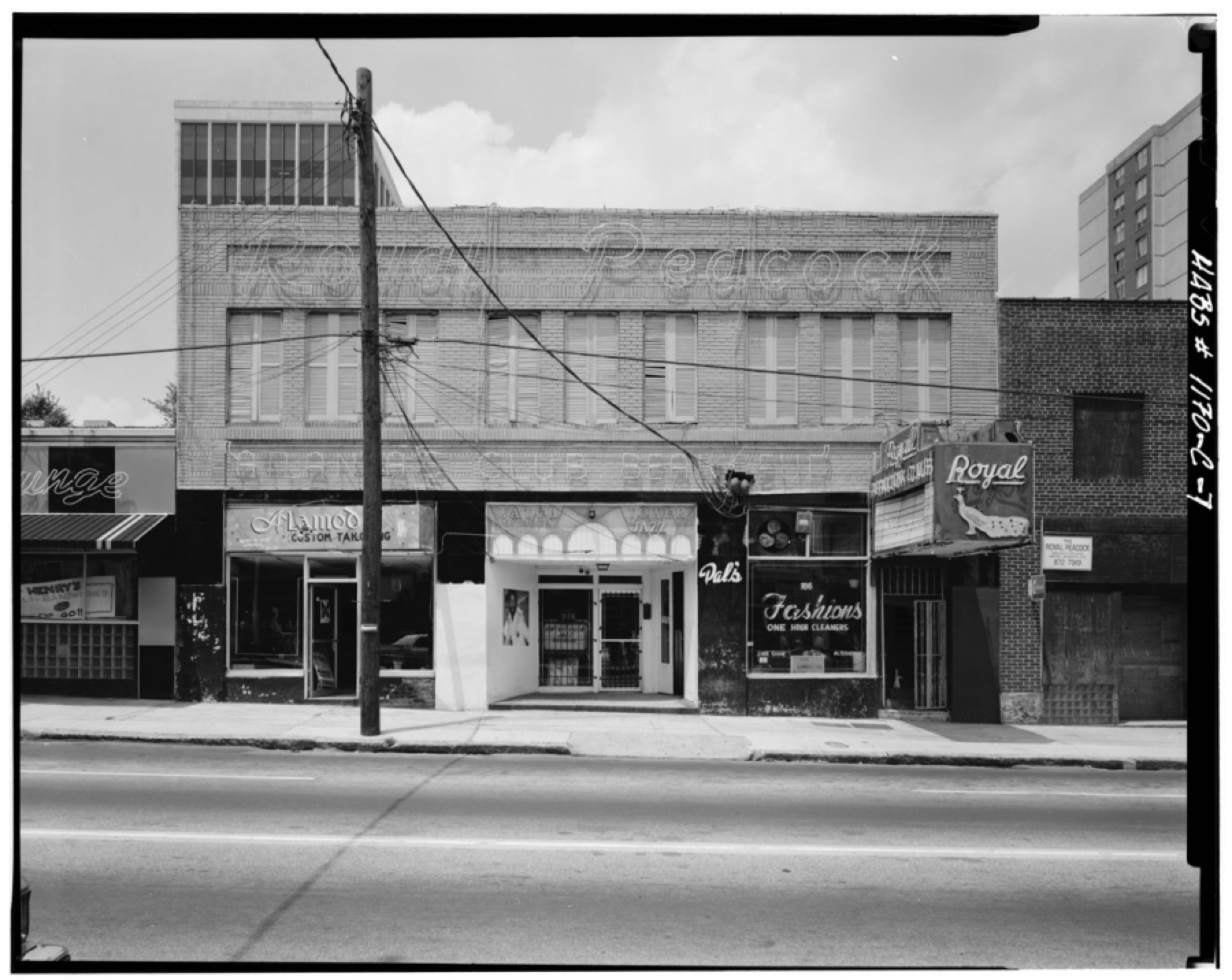
The Royal Peacock club on Auburn Avenue was central to Atlanta's deep soul scene. 1979 photograph by James R. Lockhart.
THEY CALL HER BAD GIRL
By Eliza Borné
Dept. of Georgia Music discoveries
When every music issue hits the shelves, long after the songs are selected and the sequencing is set and the CD is back from the pressing plant, we think about what else could have been. What other songs would we have liked to include on our Georgia CD compilation this year? One of my favorite storylines from the issue is that of the “second tier soul arena,” as my colleague, Maxwell George, puts it in our liner notes—the vibrant but less-known soul-funk scene in 1960s and ’70s Atlanta. Sandy Gaye’s “Watch the Dog That Bring the Bone,” track two on our CD, represents the raw energy of this music. And I love this song, every second of it—especially Gaye’s screaming intro and guitarist and songwriter Richard Marks’s unbridled barking in the background. (By the way, a reissue of Marks’s complete recordings, Never Satisfied, is among our favorite albums of the year.) Still, I can’t help but wish we’d had an extra five minutes on our mix so Lee Moses’s rendition of “Bad Girl” could rip our readers’ hearts out, too. As music historian Brian Poust argues in “With All Their Heart and Soul,” an essay in the issue about Atlanta’s brotherhood of underrated soul musicians, “Bad Girl” is so soulful it should be considered right up there with the likes of James Brown’s Live at the Apollo. Poust writes:
[“Bad Girl”] belongs at the very top of the cadre of Atlanta soul classics—a recording imbued with drama, grit, and tortured pain, with vocals delivered as throat-shredding screams. At the beginning of “Bad Girl,” Lee Moses says he’s going to tell us about “something that happened to me long time ago.” Listening to the song, it’s hard to shake the feeling that he could have just as easily been dumped in the parking lot of the recording studio.
Lee Moses released “Bad Girl” on Musicor Records in 1967. His Atlanta contemporary Hermon Hitson liked it so much he recorded his own version in 1970. The song has had a minor comeback in recent years, appearing on Eli “Paperboy” Reed’s 2009 EP Ace of Spades, and in season 3 (episode 11) of the HBO show Girls, which first aired in 2014. That’s well and good. But still I think: If only we’d had the space to honor Moses’s shrieking pain alongside James Brown, Otis Redding, Sandy Gaye, and the other geniuses on our CD.
Mama, they call her bad girl
All because she wanted to be free
All this talk of “Bad Girl” should raise an antenna for attentive OA readers. It’s a familiar motif. On our 2007 Southern Music issue CD, the Zachary Thacks, a 1960s band from Corpus Christi, Texas, belted “Baaad girl! Baad girl! Baaad girl, oh, yeah!” The chorus is “jack-hammered into the listener’s skull,” writes Anthony Mariani in the OA. “Bad Girl,” an early garage-rock gem, should have been a hit, though it never really caught on. The Thacks released it in 1966, a year before Moses’s “Bad Girl” record. (The songs are entirely different.) It was their first and only single.
Tomorrow is another day
Find another girl someway
Track 24 on our Mississippi Music issue CD is the most obscure “Bad Girl” of our trio of temptresses, released circa 1965 after a couple of teenagers (Bill Latham, 14; Ralph “Wattsy” Watts, 13) recorded the song at Sam Phillips Recording Service in Memphis. The record was pressed in Coldwater, Mississippi, and the boys went on to play one show in public. Latham and Watts called their band the Riviaires, and though it never went beyond this one recording, the single was included on the 2009 compilation Psychedelic States: Mississippi in the ‘60s. Their “Bad Girl” is irresistibly fun, with “descending melody lines and accusatory lyrics . . . reminiscent of The Beatles’ ‘I Wanna Be Your Man’ or ‘Please Please Me,’” writes Steve Klinge in the issue. “The unself-conscious enthusiasm charms, making the song sound . . . like a demo full of possibilities.”
So she will come around
Try to make you cry
Just remember one thing
Don’t you pass her by
The three recordings of “Bad Girl” are completely unique, and all worth seeking out. Find “Bad Girl” by the Zakary Thaks (1966) on the Oxford American’s 2007 Southern Music issue, or on the band’s 2001 reissue Form the Habit.
The Riviaires’ “Bad Girl” (1965) is on the Oxford American’s 2011 Mississippi Music issue, as well as Psychedelic States: Mississippi in the ‘60s.
“Bad Girl” (1967) as performed by Lee Moses gets plenty of ink in the Oxford American’s Georgia Music issue, released earlier this month—though to listen to the song you’ll have to find Moses’ vital Time and Place, reissued in 2002.


